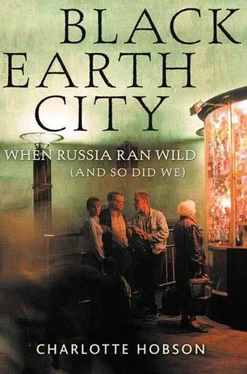Look at this: ‘firm support,’ ‘imparts silky texture to skin,’ ‘treated with herb medicine to increase size of ladies’ chest.’”
“No!”
“Yes—look. How do you know what size to buy, I wonder?”
We giggled, drank beer, and ate the picnic Mitya’s mother had packed for him: black bread, sausage, and two slices of salty white salo , pig fat. We balanced ourselves on the broken-down sun lounger that was Mitya’s bed and watched the crackly old video of Hair that Lapochka had lent us. And it was only much later, looking around at the shelves crowded with useless, expensive gimmicks, with plastic boxes three times as large as their contents, with piles of clothes and knickknacks and chemical drinks, that it all struck me as pitiful.
“You know what this reminds me of,” Mitya said, trying to cheer me up. “It’s what Sveta’s flat will be like one day, with all her hoard stacked up all around her.”
I laughed. Sveta was a student from the hostel. “Of course!” I agreed. “That’s what she’s planning. A shop selling empty shampoo bottles—”
“—and old clothes and saucepans with no handles. She’ll make her fortune.”
“Yes she will, sooner or later, I’m certain.”
If this were a Soviet novel, Sveta would surely be the heroine. She carried her beauty as though it were a mild disability; if anyone stared at her in the street or, in the Russian way, murmured compliments (“Your eyebrows are the wings of birds!”), she tossed her head and tutted. The practicalities of life were her concern. She had astonishing aquamarine eyes that looked out of her smooth, high-cheeked face with a matter-of-fact expression. Her nose was pretty and her chin was determined. The abundant tawny hair that glittered in sunlight was usually scraped back into a bun, and every muscle in her sturdy body was set to work scrubbing the floor, wringing her clothes dry, or slicing vegetables double-speed. She was always busy.
Only that afternoon, Emily and I had been lolling on our beds when we heard a rustling and clinking from the other end of the room. Looking closer, we found Sveta under the table collecting empty bottles for the deposit.
“Go ahead,” we snapped. “Don’t mind us.”
Sveta, like most people, was concentrating on surviving the winter. She didn’t collect only bottles. Under her bed were her savings, year after year of presents and castoffs from English students that she had seized upon, cleaned, and arranged neatly in boxes. Slivers of old soap, medicine, half-used notebooks, knives and forks, all tied together with little pieces of string.
“Do you want this?” she was always asking casually, picking up a bottle of shampoo with a couple of drips left in the bottom or an old pen. Viktor teased her that she was putting together her trousseau.
“Take me, Sveta. I can bring a knife and fork and half a towel to the union!”
But Sveta just tossed her head and turned away from him, smiling. She had already chosen her man. He was called Sasha, a quiet, clever boy with a soft beard who sat out in the hostel corridor. Their courtship was lengthy. Months passed while they drank tea together; Sveta’s beautiful eyes glittered and Sasha blushed. This continued until even the hostel gossips lost interest. One day, however, we noticed that Sasha no longer sat in the corridor but instead in Sveta’s room, having removed his shoes and left them neatly at the door. Sveta’s room was always spick and span and the stirrings of passion were certainly not going to interfere with hygiene.
After this, things moved more quickly. While walking home from university one evening, Sveta spotted a job advertisement among the notices on the lampposts. Sveta was a connoisseur of the notices and she saw straight away that this was something out of the ordinary. Within a week Sasha, in a neatly pressed suit, had applied for the post of assistant to an American entrepreneur and had been accepted.
A decade or so earlier, Sasha’s new employer, Mr. Jackson, was a millionaire businessman in Texas when he had a dream telling him to follow the path of spirituality or die. Mr. Jackson was so struck by the dream that he sold everything and went to India, where he spent seven years at the feet of a guru in the mountains. He was in his midseventies when the guru finally told him that only in Russia would he become truly spiritual. Upon which Mr. Jackson stuck a pin in a map of the USSR and promptly began negotiations to buy a huge farm in the Voronezh region. The idea was to found a sort of Happy Valley of plenty and communal living, combining American technology with the area’s rich black earth.
His plan seemed to be taking a long time to materialize. Sasha, when questioned, would say only that it was complicated. People used to point to a house close to the university park—a house where, according to a plaque, Tolstoy once visited his goddaughter for tea—and hiss, “The house of Mr. Jackson!” I hoped that the aging seeker after truth took comfort from this coincidence, for no doubt there was much in the progress of Russian reforms that was dispiriting.
Foreign investors had otherwise shown little interest in the city. Economic rationalization, the process by which Russia’s rusting plant was to be refashioned into consumer goods factories sweetly humming with activity, had not taken off. The glittering left bank produced at least some marketable goods. In this the city was better off than many that relied on armaments factories, like Tula; but still the Voronezh televisions gathered dust on the conveyor belt, waiting for the cathode tubes made in Tbilisi and circuit boards from the Baltic states.
“You know, they call this a transitional period,” said Mr. Uvarov to me one day, bitterly. “It’s like the early twenties. That was a transitional period too. All those Social Democrats and Social Revolutionaries, on the same side as the Bolsheviks, as they saw it, all working away to establish a socialist state. Then they were all massacred just a few years later. They had a transitional mentality, or something. That’s what they’ll say about us. ‘Of course, they tried, but they made unforgivable mistakes—victims of the transitional period, what could they do? It was their fate.’ And all the time this is our life…”
There were several attempts at joint ventures with foreign companies. An Italian firm set up a pizza restaurant: installed a shiny oven, trained a couple of chefs, and left, satisfied that one more city would now have access to civilization with extra pepperoni. For some months the pizzas were cheap, tasty, and fast. Mitya and I liked watching the chefs slapping the dough down onto the huge trays and sliding them into the oven. The restaurant was warm and bustling and although you could only stand at chest-high tables, it was always full. I seem to remember pontificating to Mitya about the advantages of the free market as we stood and ate.
“Oh, blah-blah-blah,” Mitya responded, crunching a pizza crust. We weren’t getting on so well. Also I’d refused to stop for a hundred grams of vodka on the way to the café.
Then certain types of pizza started dropping off the menu. The prices, of course, went up with inflation and the place began to empty. We still came, although we often had to wait ten minutes for the chef to appear behind his counter. Then the pizza dough turned gray and gritty and the toppings shrank to a smear of tomato and a few hunks of sausage. I don’t know what the story was: protection money almost certainly, difficulties with supplies, low morale, and perhaps just a sort of diffusion, an atmosphere that somehow smeared itself even on that shiny oven.
The Gastronom on Revolution Prospect where we collected our sugar ration was at the thin end of the diffusion process. We were given coupons for all the necessities: grain, meat, butter, eggs, household soap, and one bottle of vodka a month, but it was only sugar that was strictly rationed. Picking it up was bleak. We waited in line first to show our passports and sign the register. Then we lined up again, watching the assistant as she shoveled pinkish granulated sugar into bags. Her big arms were flushed with exertion and her mouth was grimly set. Bag after bag was whisked over the scales and dumped on the counter as she yelled, “Next!”
Читать дальше












